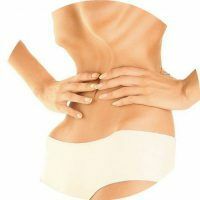
Sibutramine is an anorexigenic drug effective for weight loss, which is prescribed only for indications for the treatment of severe obesity. However, the uncontrolled or improper use of this medication can lead to various unpleasant consequences.
Composition and dosage
The active substance of the drug - sibutramine hydrochloride - is available in the form of capsules of 10 and 15 mg. Used as an additional tool in the fight against excess body weight. Sibutramine is used in conjunction with carefully controlled dietary nutrition and increased physical activity. The medicine reduces appetite and the amount of food consumed by the patient, increases thermogenesis and affects brown fatty tissue.
During therapy, a slight increase in blood pressure is recorded in patients( for 2-4 mm Hg) and heart rate increases( by 4-8 beats per minute), but in some cases more serious changes are possible.
During the course of treatment with Sibutramine, it is necessary to control the level of blood pressure and heart rate every 14 days during the first 2 months of treatment, and then reduce to 1 time per month. In people with arterial hypertension at a pressure level of 145/90 mm Hg, therapy should be discontinued and refer for recommendations to the treating doctor.
Appearance during the treatment of chest pains, respiratory disorders( dyspnoea) and edema of the lower limbs indicates a possible development of pulmonary hypertension, in this case, you should also contact the physicians.
to contents ^Mechanism of action
Sibutramine accelerates the release of serotonin, which affects the appearance of a sense of rapid saturation, resulting in a craving for carbohydrate food decreases. At the same time, excess fat deposits are actively burnt and excess kilograms go away. Among the positive moments, the ability of the drug to reduce the amount of "bad" cholesterol and increase the formation of "good", which helps the metabolic process, is also noted.
to table of contents ^Indications
Sibutramine, according to the instruction, is used as a part of the supportive complex treatment of patients with excess weight in cases:
- Alimentary obesity( body mass index BMI - from 30 kg / m2 and more).
- Alimentary obesity( BMI from 27 kg / m2) if there are other risk factors for excess body fat, including type II diabetes or dyslipoproteinemia.
Contraindications
- Acute and chronic diseases of the kidneys, liver, cardiovascular system.
- Glaucoma.
- Anorexia.
- Bulimia.
- Hyperthyroidism.
- Mental illness.
- Organic obesity.
- Tourette's syndrome( hereditary genetic disorder of the nervous system, which manifests itself in multiple motor tics accompanied by vocal or mechanical tics).
- Chronic diseases of peripheral arteries.
- Uncontrolled hypertension.
- Congenital malformations of the myocardium, ischemic heart disease, chronic failure in the stage of decompensation.
- Tachycardia, arrhythmia and other disorders of cerebral circulation, including transient.
- Pheochromocytoma( hormonal adrenal tumor).Benign prostatic hyperplasia.
- Narcotic, alcoholic or pharmacological dependence.
- Hypersensitivity to the active ingredient.
- Neuroleptics, antidepressants, tryptophan and other drugs that have a depressant effect on the central nervous system.
- MAO inhibitors.
- Other drugs that also help reduce body weight.
Use with caution while taking medications that increase the QT interval( electrical ventricular systole), in patients:
- Epilepsy.
- Hypomagnesemia and hypokalemia.
- With mild liver function disorders( the risk of asymptomatic increase in sibutramine concentration in the blood increases).
- With impaired renal function of mild degree( since inactive metabolites are partially excreted with the kidneys).
- With vocalisms or motor tics in a family history.
- Taking medications that increase heart rate and blood pressure( including medications used for allergies, coughs, colds).
Because of a lack of clinical data, sibutramine is not given to people over 66 years of age.
to table of contents ^Consequences of
Among the negative consequences are marked:
- swings and increased blood pressure;
- problems with cardiac activity;
- pronounced apathy;
- mood swings.
The drug provokes the appearance of a cold, muscle pains, inflammation of the mucous membrane of the stomach and intestines, a decrease in sexual desire. The work of the sebaceous and sweat glands is disrupted, as a result of which acne appears on the body, sweating increases, the menstrual cycle may be disturbed. Deterioration of saliva production, which provokes the appearance of ulcers in the mouth, can develop caries.
Rare and very serious complications of taking Sibutramine are serotonin and malignant neuroleptic syndrome. Signs of this condition include increased anxiety, anxiety, fever, diarrhea, nausea, vomiting, impaired pulse, coma. If any of these symptoms occur, it is recommended that you seek medical help immediately.
During treatment with drugs containing the active substance sibutramine, and after it is completed, you should periodically undergo a medical examination to monitor the weight reduction and overall health of the patient.
to the table of contents ^With alcohol
With Sibutramine, alcohol and drugs that reduce drowsiness should be avoided. The agent can cause dizziness or darkening of visible objects, this effect is enhanced if you drink alcohol, which adversely affects the ability to drive a vehicle or perform work associated with increased attention and reaction speed.
to the table of contents ^Pregnancy
Analogues
For active substance, the substitutes for Sibutramine are Lindax, Goldline, Meridia and Slymia. If necessary, a specialist can replace a medicine with one of the analogues with a similar therapeutic effect: Fepranon with the active ingredient amfepramonom, and Reduxin, containing in addition to sibutramine and cellulose microcrystalline.
